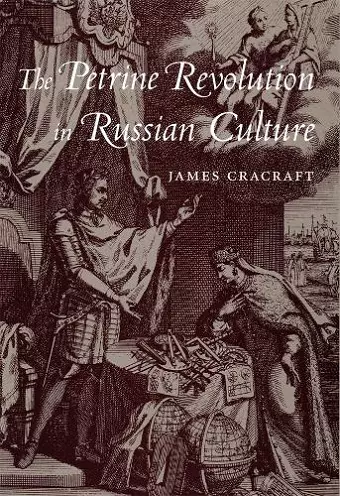The Petrine Revolution in Russian Culture
Format:Hardback
Publisher:Harvard University Press
Published:29th Aug '04
Currently unavailable, and unfortunately no date known when it will be back

No previous author has attempted to document the changes in the Russian language during Peter the Great's reign by setting such a wide range of texts in historical context--with full reference to the European background--in a discussion accessible to non-specialists. James Cracraft extends the definition of literature beyond foreignword>belles lettres and private writings, in which the Petrine era is relatively poor, to 'verbal culture,' in which it is rich, thereby offering a much wider range of material from a crucial age of reform and allowing exploration of such phenomena as the vocabulary of political power. In no other work in print in English can one find such detailed expositions of the publishing history and contents of such key texts as the Naval Statute and Military Statutes. Cracraft's judicious interpretation will be invaluable to serious students of Russian history. This is a work of immense erudition and a major contribution to scholarship. -- Lindsey Hughes, University College London
The reforms initiated by Peter the Great transformed Russia not only into a European power, but into a European culture--a shift, argues Cracraft, that was nothing less than revolutionary. The author of seminal works on visual culture in the Petrine era, Cracraft now turns his attention to the changes that occurred in Russian verbal culture.
The reforms initiated by Peter the Great transformed Russia not only into a European power, but into a European culture--a shift, argues James Cracraft, that was nothing less than revolutionary. The author of seminal works on visual culture in the Petrine era, Cracraft now turns his attention to the changes that occurred in Russian verbal culture.
The forceful institutionalization of the tsar's reforms--the establishment of a navy, modernization of the army, restructuring of the government, introduction of new arts and sciences--had an enormous impact on language. Cracraft details the transmission to Russia of contemporary European naval, military, bureaucratic, legal, scientific, and literary norms and their corresponding lexical and other linguistic effects. This crucial first stage in the development of a "modern" verbal culture in Russia saw the translation and publication of a wholly unprecedented number of textbooks and treatises; the establishment of new printing presses and the introduction of a new alphabet; the compilation, for the first time, of grammars and dictionaries of Russian; and the initial standardization, in consequence, of the modern Russian literary language. Peter's creation of the St. Petersburg Academy of Sciences, the chief agency advancing these reforms, is also highlighted.
In the conclusion to his masterwork, Cracraft deftly pulls together the Petrine reforms in verbal and visual culture to portray a revolution that would have dramatic consequences for Russia, and for the world.
[This is] the third volume of James Cracraft’s authoritative study of what he terms Peter’s ‘cultural revolution’… In his first two volumes Cracraft dealt with architecture and the arts. In The Petrine Revolution in Russian Culture, the focus is on ‘verbal culture’: the creation of what was virtually a new language, with a greatly expanded vocabulary, written in a ‘civil script’ suited to printed publication… James Cracraft provides a solid and thorough evaluation of Petrine Russia’s great leap forward in the arts of civilization. -- John Keep * Times Literary Supplement *
This volume is the third, final, and most synthetic of the massive study of Petrine culture that James Cracraft undertook nearly two decades ago. Taken together, the works amount to an unquestionable tour de force by an outstanding historian of early modern Russia… As ever, Cracraft is an elegant expositor whose points of view are equally accessible to specialists and general readers… What we have, then, is something more than the proverbial welcome addition to the field. Cracraft has provided us with a genuinely important work, the capstone of decades of study, that deserves a wide audience and discussion. -- Gary Marker * American Historical Review *
The work demonstrates for historians and political scientists how new avenues might be taken to illuminate the State’s exercise of power in Russia. Furthermore, it should serve as a spur for novel approaches in the study of statecraft in general. -- Andrew Gentes * Australian, Slavic, and East European Studies *
No previous author has attempted to document the changes in the Russian language during Peter the Great’s reign by setting such a wide range of texts in historical context—with full reference to the European background—in a discussion accessible to non-specialists. James Cracraft extends the definition of literature beyond belles lettres and private writings, in which the Petrine era is relatively poor, to ‘verbal culture,’ in which it is rich, thereby offering a much wider range of material from a crucial age of reform and allowing exploration of such phenomena as the vocabulary of political power. In no other work in print in English can one find such detailed expositions of the publishing history and contents of such key texts as the Naval Statute and Military Statutes. Cracraft’s judicious interpretation will be invaluable to serious students of Russian history. This is a work of immense erudition and a major contribution to scholarship. -- Lindsey Hughes, University College London
- Nominated for Wayne S. Vucinich Book Prize 2005
- Nominated for George L. Mosse Prize 2005
ISBN: 9780674013162
Dimensions: unknown
Weight: unknown
576 pages